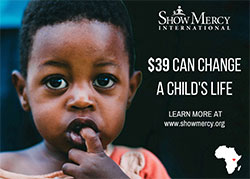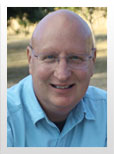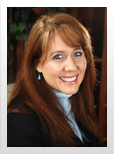My grandmother sobbed, pleading to take her daughter's place. But the soldier didn't want an illiterate old woman. Pol Pot's orders were to eliminate the educated.
At the communist headquarters, kneeling before the Mit, the local Khmer Rouge leader, who was flanked by grim-faced soldiers, my mother didn't beg for her life. Instead she asked if she could tell a story. Puzzled, the Mit nodded. Used to entertaining her students with vivid fairytales, my mother began to tell a story about a wealthy merchant and his faithful guard dog. She described how a thief tricked some villagers into believing the merchant's dog was rabid and enlisted their help in clubbing the innocent dog to death. After the murder of the guard dog, the scoundrel returned at night to rob and kill the merchant.
"I am like that dog," she said. "I'm just a simple, loyal, dumb beast. I am no teacher. I can't read. I can't even write my own name. If you believe them and kill me, you will be tricked, just like those foolish villagers."
Caught up in her storytelling, the Khmer Rouge ended up releasing her. She walked back to her family, convinced she had witnessed a miracle—no one who was taken away by Pol Pot's men returned alive. It was one of many times my mother escaped death during the four years of the Killing Fields, and one of many times she used her mind and wits to help her and her children survive.
For my mother, Sovanna Soeung, education was the key to escaping the poverty of her childhood and eventually genocide. Growing up in 1950s Cambodia, my mother, small, scraggly and stubborn, dreamed of going to school and becoming a teacher, one of the most respected professions in Cambodia. None of her four older sisters were allowed to attend school beyond the sixth grade; at age nine, my mom had never entered a school building or opened a book. Societal norms—and her father—dictated that women should not be educated.
 But my grandmother, a sweet-tempered woman who generally obeyed her husband, disagreed. She marched her youngest daughter to the school house, several miles from their rural farm, and enrolled her. (Photo: Family in a refugee camp/courtesy-SreyRam Kuy)
But my grandmother, a sweet-tempered woman who generally obeyed her husband, disagreed. She marched her youngest daughter to the school house, several miles from their rural farm, and enrolled her. (Photo: Family in a refugee camp/courtesy-SreyRam Kuy)
At that time in Cambodia, education was a luxury for the sons of well-to-do families. My grandfather refused to pay, leaving my grandma to find money for books and school fees. She chopped wood in the forest and rolled incense sticks to sell at the market. My mom picked wild herbs and caught fish in the nearby stream to sell. Together, they scraped together the meager riels needed to pay for school. In a threadbare school uniform, tattered books in hand, my mom excelled and eventually became a teacher.
My mother enjoyed a few carefree years as a young teacher. She married, had a baby girl and moved to the capital city of Phnom Penh with my grandmother. But by the early 1970s, there were rumblings of warfare. Soldiers began patrolling the streets, and refugees from the countryside flooded the cities to escape bombings. Most Cambodians thought the war would end and life would go on as usual, until April 1975, during the Cambodian New Year. The atmosphere was ebullient, as children played games like Chab Kon Kleng, young women performed the ancient Apsara dance and everyone feasted on banana leaf-wrapped tapioca treats and ahn som, sweetened sticky rice and savory pork. My family was startled by gunfire outside the house. Khmer Rouge soldiers in plaid karma scarves burst into homes, forcing families into the streets at gunpoint. Anyone who resisted was shot. That day, millions of Cambodians were driven from the cities and forced to begin a life of slave labor, and Pol Pot's savage quest to murder the country's educated citizens commenced.
An estimated 3 million died during the Killing Fields, from torture, execution, starvation and disease. Some committed suicide to escape the nightmare, but my mother persisted. She sneaked into the jungles at night after working all day in the rice fields to forage for food for her family. She dug up bamboo shoots from a creek bed with her bare hands. She once stumbled upon a litter of tiger cubs and didn't stop running until she made it back to our shack, breathless and terrified. But she still needed to feed us, and she returned to the river bed to gather more bamboo shoots. She wasn't afraid of tigers; she had the heart of a tiger.
Four vicious, bloody years later, the Khmer Rouge was overthrown, and Cambodians were released to return to their homes. We had nothing but the rags on our backs. Our home in Phnom Penh had been demolished and my mother's family farmland taken over by squatters.
My mother took my sister and me, now ages 5 and 1, to glean a rice field after harvest. We ended the day without a full handful of rice. A man loading the rice wagon took pity and gave us several handfuls of rice. At home, we pounded off the chaff. My mom took the small portion of rice and made a watery porridge for the family. That was life in Cambodia after the war.
 My mother realized then that there was no hope for her daughters in Cambodia—no universities, hospitals or opportunities. Education had been her ticket to escape poverty, and she believed it was the only way for a better life for her children. She decided to leave. (Photo: Author's mother in a refugee camp/courtesy-SreyRam Kuy)
My mother realized then that there was no hope for her daughters in Cambodia—no universities, hospitals or opportunities. Education had been her ticket to escape poverty, and she believed it was the only way for a better life for her children. She decided to leave. (Photo: Author's mother in a refugee camp/courtesy-SreyRam Kuy)
Since the overthrow of the Khmer Rouge in 1979, 750,000 Cambodians tried to flee the country. Thousands died attempting to cross the land mines that lined the borders. In May 1980, we began our escape. We fled through jungles laced with landmines, evaded the armed border patrol and crawled under a rusty, barbed wire fence to get to Khao-I-Dang refugee camp, across the border from Cambodia. We thought we were safe.
Two weeks later, errant border patrol shells hit the camp. One shell detonated near our tent. Shielding her children with her body, my mom sustained most of the impact of the RPG explosive and was severely wounded. My left ear was partially torn off. My sister was covered in lacerations. A German Red Cross surgeon operated on me, stopping the bleeding from my scalp and sewing my ear back into place, and on my mother. Today a scar runs by my left ear and down my jaw; disfiguring cicatrices lacerate my mother's belly and gnarl her arms—reminders of the debt we owe that surgeon.
We lived in four different refugee camps for a year and a half before the news: We had been sponsored to the United States by a Christian missionary group.
My mom arrived in the U.S. destitute, unable to speak the language and ravaged by memories of the killing fields. With two children in tow, she clung to her faith and hope for a new life. She scrubbed toilets as a housekeeper at Good Samaritan Hospital during the day and cleaned houses for doctors in the evening. Late at night, she mopped floors at the Oregon State University thrift shop. Still weak from the injuries she sustained during the bombing, she would walk one block, then stop and sit on the ground to rest before getting up to continue her walk to work. In the summers, we worked in the fields of Oregon's Willamette Valley alongside Mexican migrant farm workers, picking berries, tomatoes, green beans and garlic.
My mom, who had worked so diligently to get an education, was never ashamed of her work. She was proud to be an American and to work so that her children could go to school. She instilled in her daughters courage, gratitude and faith in a miraculous God.
 After more than a year of scrubbing toilets, mowing lawns, cleaning houses and picking berries, we finally saved up enough money to buy a car. My mom showed up to the first car dealership, wearing shabby clothes gleaned from the reject bin at the thrift shop we cleaned at night. "We buy car," she excitedly said in her broken English, pulling out stacks of one, five, 10 and 20 dollar bills. The first dealership turned her away, unsure of what to make of this bedraggled bag lady. Undeterred, we went to another dealership which sold us a Nissan Sentra. (Photo: Family's first car/courtesy-SreyRam Kuy)
After more than a year of scrubbing toilets, mowing lawns, cleaning houses and picking berries, we finally saved up enough money to buy a car. My mom showed up to the first car dealership, wearing shabby clothes gleaned from the reject bin at the thrift shop we cleaned at night. "We buy car," she excitedly said in her broken English, pulling out stacks of one, five, 10 and 20 dollar bills. The first dealership turned her away, unsure of what to make of this bedraggled bag lady. Undeterred, we went to another dealership which sold us a Nissan Sentra. (Photo: Family's first car/courtesy-SreyRam Kuy)
She began teaching herself to drive in the neighborhood, and later on the highway. A few weeks later, she drove herself to the DMV and passed her driving test.
Thanks to this work ethic ingrained in me by my mother, I graduated from Crescent Valley High School as valedictorian and attended Oregon State University—the very school where my mother mopped floors. I went on to earn a medical degree at Oregon Health Sciences University and a master's in health services research at Yale. Today, 34 years after arriving in the U.S., I'm a surgeon. My mother cleaned bedpans at Good Samaritan Hospital; now I care for veterans and operate on patients at Overton Brooks VA Medical Center. My mom fought for the chance to learn to read in a one-room, rural school house. I learned from dignitaries and power brokers in the Ivy League. My sister is a podiatrist, taking care of underserved patients with renal failure and diabetes.
 Now in her early 70s, my mother still has the same untamable spirit. In January, she returned to her home village in Cambodia for her third mission trip. She led worship services, helped baptize 33 people, passed out nearly 1,000 Khmer language Bibles and distributed new school uniforms for children, which she had lovingly packaged, remembering the shabby clothes she once wore as a poor school girl. (Photo: Author's mother leading worship in Cambodia/courtesy-SreyRam Kuy)
Now in her early 70s, my mother still has the same untamable spirit. In January, she returned to her home village in Cambodia for her third mission trip. She led worship services, helped baptize 33 people, passed out nearly 1,000 Khmer language Bibles and distributed new school uniforms for children, which she had lovingly packaged, remembering the shabby clothes she once wore as a poor school girl. (Photo: Author's mother leading worship in Cambodia/courtesy-SreyRam Kuy)
My mom doesn't like to say that she's proud of us. Mostly she says that she's happy for us—happy that her children had a chance at an education. The very fact that I survived, when 3 million lost their lives during the Killing Fields, is astonishing and humbling. That my sister and I work as doctors in this country, safe and free, is a miracle.
SreyRam Kuy is director of the Center for Innovations in Quality, Outcomes and Patient Safety at Overton Brooks VA Medical Center and an assistant professor of surgery at LSU-Shreveport.



 "Now in her early 70s, my mother still has the same untamable spirit. In January, she returned to her home village in Cambodia for her third mission trip. She led worship services, helped baptize 33 people, passed out nearly 1,000 Khmer language Bibles and distributed new school uniforms for children, which she had lovingly packaged, remembering the shabby clothes she once wore as a poor school girl."
"Now in her early 70s, my mother still has the same untamable spirit. In January, she returned to her home village in Cambodia for her third mission trip. She led worship services, helped baptize 33 people, passed out nearly 1,000 Khmer language Bibles and distributed new school uniforms for children, which she had lovingly packaged, remembering the shabby clothes she once wore as a poor school girl." But my grandmother, a sweet-tempered woman who generally obeyed her husband, disagreed. She marched her youngest daughter to the school house, several miles from their rural farm, and enrolled her. (Photo: Family in a refugee camp/courtesy-SreyRam Kuy)
But my grandmother, a sweet-tempered woman who generally obeyed her husband, disagreed. She marched her youngest daughter to the school house, several miles from their rural farm, and enrolled her. (Photo: Family in a refugee camp/courtesy-SreyRam Kuy) My mother realized then that there was no hope for her daughters in Cambodia—no universities, hospitals or opportunities. Education had been her ticket to escape poverty, and she believed it was the only way for a better life for her children. She decided to leave. (Photo: Author's mother in a refugee camp/courtesy-SreyRam Kuy)
My mother realized then that there was no hope for her daughters in Cambodia—no universities, hospitals or opportunities. Education had been her ticket to escape poverty, and she believed it was the only way for a better life for her children. She decided to leave. (Photo: Author's mother in a refugee camp/courtesy-SreyRam Kuy) After more than a year of scrubbing toilets, mowing lawns, cleaning houses and picking berries, we finally saved up enough money to buy a car. My mom showed up to the first car dealership, wearing shabby clothes gleaned from the reject bin at the thrift shop we cleaned at night. "We buy car," she excitedly said in her broken English, pulling out stacks of one, five, 10 and 20 dollar bills. The first dealership turned her away, unsure of what to make of this bedraggled bag lady. Undeterred, we went to another dealership which sold us a Nissan Sentra. (Photo: Family's first car/courtesy-SreyRam Kuy)
After more than a year of scrubbing toilets, mowing lawns, cleaning houses and picking berries, we finally saved up enough money to buy a car. My mom showed up to the first car dealership, wearing shabby clothes gleaned from the reject bin at the thrift shop we cleaned at night. "We buy car," she excitedly said in her broken English, pulling out stacks of one, five, 10 and 20 dollar bills. The first dealership turned her away, unsure of what to make of this bedraggled bag lady. Undeterred, we went to another dealership which sold us a Nissan Sentra. (Photo: Family's first car/courtesy-SreyRam Kuy) Now in her early 70s, my mother still has the same untamable spirit. In January, she returned to her home village in Cambodia for her third mission trip. She led worship services, helped baptize 33 people, passed out nearly 1,000 Khmer language Bibles and distributed new school uniforms for children, which she had lovingly packaged, remembering the shabby clothes she once wore as a poor school girl. (Photo: Author's mother leading worship in Cambodia/courtesy-SreyRam Kuy)
Now in her early 70s, my mother still has the same untamable spirit. In January, she returned to her home village in Cambodia for her third mission trip. She led worship services, helped baptize 33 people, passed out nearly 1,000 Khmer language Bibles and distributed new school uniforms for children, which she had lovingly packaged, remembering the shabby clothes she once wore as a poor school girl. (Photo: Author's mother leading worship in Cambodia/courtesy-SreyRam Kuy)







